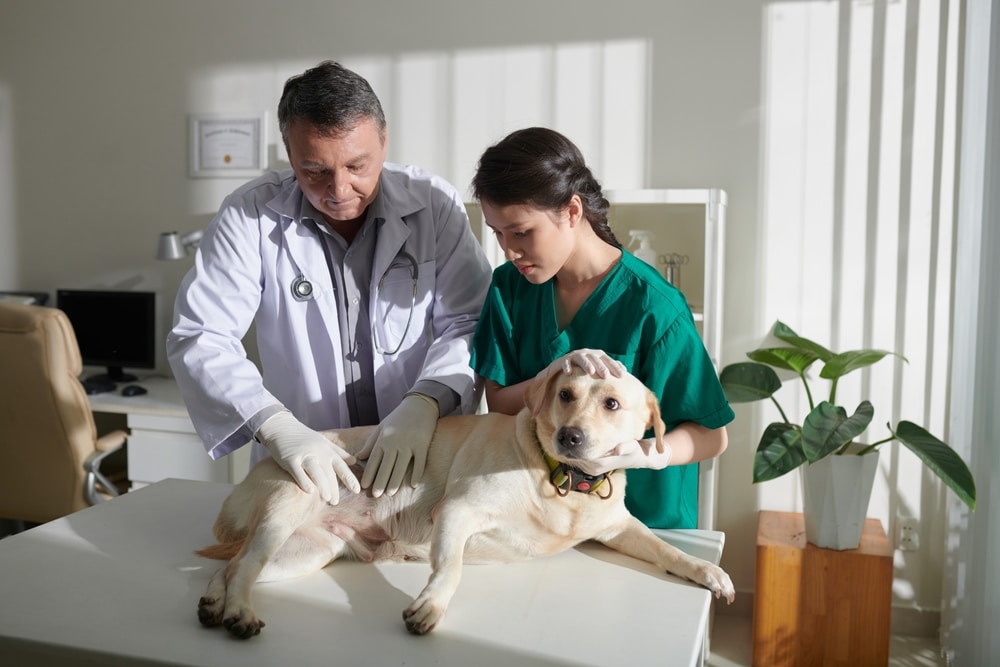While dogs commonly vomit occasionally, excessive or prolonged vomiting is cause for concern. Getting to the root of the problem is key to successful treatment, so if your canine companion vomits or develops other symptoms, head to Pets & Friends Animal Hospital for a diagnosis. Our team outlines potential causes for your dog’s vomiting, so you know what to watch for and what to expect.
1: Dogs and dietary indiscretion
Dogs are notorious for their scavenging. Whether they’re raiding the trash bin or sneaking a treat off the counter, ingesting something inappropriate often leads to vomiting. Common culprits include spoiled food, bones, garbage, or excessive treats. If your dog has recently eaten something unusual, vomiting could be their body’s way of expelling it.
2: Sudden diet changes can upset dogs
Switching your dog’s food abruptly can upset their stomach. Dogs have sensitive digestive systems, and any diet change should be gradual to prevent digestive issues like vomiting and diarrhea. Introduce new food slowly over several days to allow their system time to adjust.
3: Gastrointestinal upset in dogs
Dogs can experience gastrointestinal (GI) issues similar to people. Causes may include infections, parasites, inflammatory bowel disease, or food sensitivities. Vomiting accompanied by diarrhea, lethargy, or an appetite change could indicate an underlying issue that requires veterinary attention.
4: Foreign objects and dogs
An ingested foreign object, such as a toy, sock, or small household item, can lodge in your dog’s GI tract and cause vomiting. Watch for lack of appetite, abdominal discomfort, or changes in stool consistency that may indicate a blockage and may require surgical removal.
5: Pancreatitis in dogs
Pancreatic inflammation (i.e., pancreatitis) can cause vomiting in dogs. Pancreatitis is often triggered by high-fat foods, table scraps, or sudden dietary indiscretions, although certain breeds are predisposed and can experience flares without inciting factors. Dogs with pancreatitis may also exhibit abdominal pain, diarrhea, and a reluctance to eat. Pancreatitis requires veterinary treatment, which may include dietary adjustments, medications to manage pain and nausea, and supportive care, such as intravenous fluids.
6: Motion sickness in dogs
Like some people, dogs can suffer motion sickness during car rides or other forms of travel. If your dog consistently vomits during trips, talk to our Pets & Friends Animal Hospital veterinarian about possible medications or techniques to help alleviate their discomfort.
7: Heatstroke in dogs
In hot weather, dogs can suffer from heatstroke, which can cause not only vomiting, but also a rapid heart rate, disorientation, and collapse. Keep your dog cool and hydrated during hot weather and seek veterinary care immediately if you suspect heatstroke.
8: Infectious diseases in dogs
Certain infectious diseases, such as parvovirus or distemper, can cause dogs to vomit and can be life-threatening and require immediate veterinary treatment. Vaccinations can help prevent some of these illnesses, so keep your dog’s vaccinations up to date.
9: Doggy stress
Like people, dogs can be stressed and anxious, which can manifest in physical symptoms like vomiting. Changes in routine, loud noises, new environments, or separation from their owner can trigger stress-related vomiting. Ensuring your dog has a calm and secure environment can help alleviate these symptoms.
Tips for preventing vomiting in dogs

You can prevent vomiting in your dog with proactive measures that also maintain their overall health, including:
- Proper diet — Feed your dog a well-balanced diet appropriate for their age, size, and health status. Avoid sudden food changes and limit table scraps or human food treats, especially those high in fat or spices. Establish a regular feeding schedule and avoid overfeeding, as obesity can contribute to digestive issues.
- Supervision — Create a safe environment for your dog by keeping hazardous substances, such as cleaning products, medications, and toxic plants, out of reach. Dogs are curious creatures and, left unsupervised, may ingest harmful items. Similarly, prevent access to small objects or toys that could be swallowed and lead to GI blockages.
- Regular exercise — Promote regular exercise and mental stimulation to help reduce stress levels in your dog. Physical activity not only supports their overall health, but also aids in maintaining a healthy digestive system.
- Monitoring — Regularly check for signs of vomiting, diarrhea, or other stool abnormalities, and promptly consult our veterinarian if you notice any concerning changes.
- Veterinary care — Staying up to date on your dog’s preventive care, such as vaccinations and parasite prevention, will help ward off illnesses that can cause vomiting.
If your canine companion vomits often or excessively, or if they develop additional symptoms, schedule an appointment with our Pets & Friends Animal Hospital team as soon as possible.

